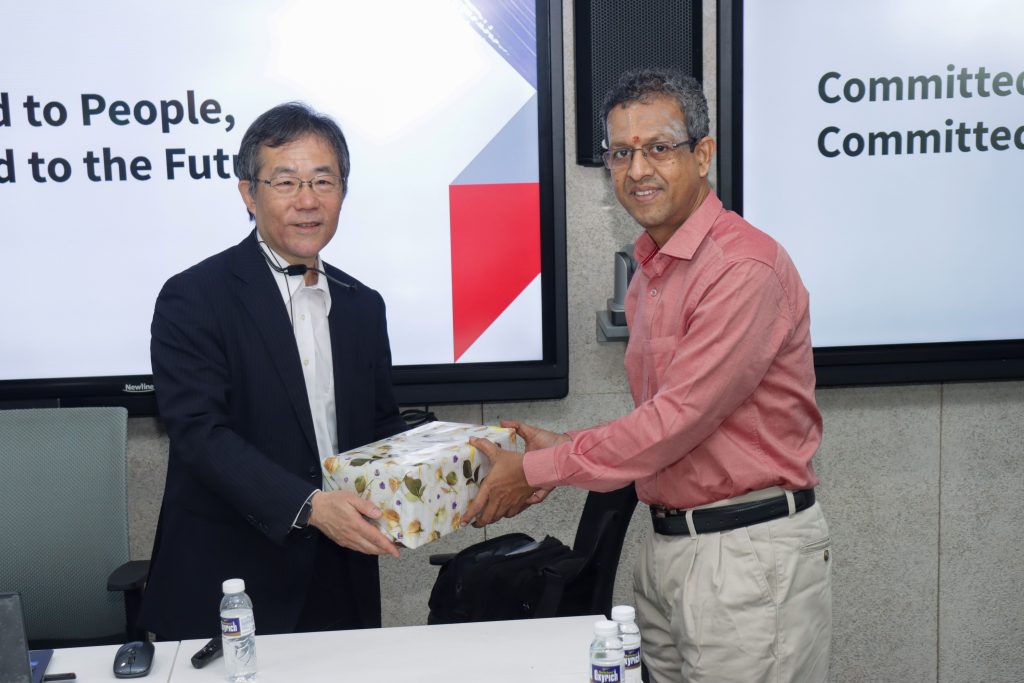MTech in Computer Science and Engineering | SRM University AP

Have you always wanted to pursue a career in a specialised field? Are you considering getting an MTech degree?
If so, you’re not alone! Many people are looking to specialise in a particular field, and an MTech degree is one way to do it. This blog post will discuss what it takes to pursue an MTech degree and what to expect from this journey
Why an MTech Degree?
Benefits of Pursuing the Most Sought After Career Option
- Knowledge and Expertise in Technical Subjects
An MTech degree offers an in-depth study of a specific technical subject, allowing you to become an expert in your field. By doing MTech, you not only get knowledge about a particular area but also develop strong communication, problem-solving and analytical skills. You become eligible to work in industry and research fields that require technical expertise.
- Successful Career Prospects
With an MTech degree, one can expect better job prospects and salary packages than with other degrees. It also provides the opportunity to learn highly advanced technologies and equip yourself for a successful career in technology-based organisations. With an MTech degree, one can increase job marketability and become more attractive to potential employers.
- Gateway to Higher Studies and Research
An MTech degree opens the door to further studies or research and may lead to better job opportunities. It is an excellent way for those interested in technology to gain knowledge and better understand the field.
- Specialisations in Your Area of Interest
Aside from this, MTech can also allow students to specialise in a particular area or branch of technology and gain expertise. Moreover, it also opens the door to further research opportunities and postgraduate studies.
- Stay Ahead of the Curve
Studying MTech can be highly beneficial for those looking to advance their career or pursue academic goals in the technology field. With an MTech degree, you can stay up to date with the latest technologies and gain valuable knowledge that will benefit your career and personal life. You can stay ahead of the curve and keep up with the rapidly changing technology industry.
Are you looking for a promising MTech Programme?

The Large Umbrella of MTech Programmes
An MTech degree offers a specialised and advanced education that can give graduates an edge in the job market.
- Materials and Manufacturing MTech Programmes
Materials and Manufacturing MTech programmes provide a deep understanding of Materials Science, Materials Engineering, and Manufacturing processes, which can be applied to a wide range of industries.
Graduates with a Materials and Manufacturing MTech degree can access rewarding and well-paying positions in areas such as,
-
- Aerospace engineering
- Automotive engineering
- Biomedical engineering
– that require expertise in materials and manufacturing technology.
The practical knowledge gained from Materials and Manufacturing MTech studies can help develop new materials for use in production pipelines or create innovative manufacturing processes that streamline production times whilst improving quality control, making the Materials and Manufacturing MTech degree beneficial to the individual graduate and employers alike.
- Surplus Opportunities to Work on Research Projects
Pursuing an MTech degree provides opportunities to work on research projects, which can create networking opportunities and help you hone your skills.
For example, Thermal MTech students get to explore the fascinating field of Thermal engineering, such as Thermal design and Thermal analysis.
They also get to work on projects related to,
- Thermal energy management
- Thermal systems design
- Thermal control systems.
- The Bright Side of Thermal Engineering
Working on research projects in Thermal engineering can also give students an edge in the industry as it enhances their understanding of Thermal principles and technologies.
Valuable industry experience and essential connections in the Thermal engineering field through their research work.
All these advantages make pursuing an MTech degree worthwhile for those interested in Thermal engineering.
MTech provides invaluable insight into the latest breakthroughs and technologies in your field, helping you stay ahead of the curve.
Studying for an MTech can provide immense advantages for those in the technological field, particularly IoT technologies. Not only does it offer the opportunity to gain higher qualifications and broaden skills, but it can also provide invaluable insight into the latest IoT breakthroughs and technologies, helping students stay ahead of the curve.
- The Perks of an MTech in VLSI
An MTech in VLSI will allow you to develop advanced knowledge and skills, making a VLSI engineer highly sought after in many industries. As a VLSI engineer, you can work with hardware design, device fabrication, circuit design and debugging, amongst other skills, which will give you a competitive edge over other job applicants.
- Possibilities of the Internet of Things (IoT)

IoT (Internet of Things) related coursework provides students with comprehensive technical and practical insight into IoT systems development. Technical topics like IoT architecture, IoT standards and IoT security are taught in detail, enabling those who complete the program to gain specialised knowledge in the IoT domain.
Furthermore, the programme also typically offers a research-based thesis which enables students to apply their IOT skills to real-world problems. In this way, MTech programmes provide an excellent opportunity for students to understand IoT systems and technologies deeply.
What to Expect From an MTech Degree?
-
- Opportunity to develop their professional skills through hands-on projects and internships
- Opportunity to become experts in Data Science and its associated technologies.
- Data Science is a rapidly evolving field, and an MTech will provide the guidance needed to stay current and be at the forefront of Data Science development.
- Provides students with the ability to gain a deeper understanding of Data Science and its applications, which can help them get better jobs or progress their careers.
Where Will You Be After graduation?
Upon graduation, MTech graduates are highly sought after in the job market, with many top companies offering competitive salaries for those with an MTech degree.
Furthermore, an MTech degree is a tremendous advantage as Thermal graduates are highly sought after in the job market.
Thermal graduates have specialised knowledge, making them more attractive to companies and often offered competitive salaries.
An MTech degree provides Thermal graduates with unique skills and qualifications that make them stand out in the job market and ensure they have a competitive advantage over other applicants.
Making the Most of Your MTech Degree; Yes That’s What Makes the difference!
With an MTech degree, you can pursue a plethora of career options.
What are the Most Coveted Career Options After MTech?
-
-
- Engineering
- Research and development
- Data science
- Materials and Manufacturing
-
- The Scope of Materials and Manufacturing
Materials and Manufacturing are two areas often explored in an MTech course.
-
-
- Provide you with knowledge of materials used in industries and hands-on experience working with them.
- Access to other related fields, such as chemical engineering and robotics.
- Enable you to develop expertise in manufacturing processes, including production planning, cost control and product design.
- On completing the degree, you can embark on a career as a Materials and Manufacturing Engineer with high growth prospects.
- Exclusive job opportunities in the government sector.
-
- The Future of MTech in VLSI
MTech in VLSI empowers students to get VLSI-related roles in the government and even industries like Aerospace, Medical electronics, Automotive industry, etc.
VLSI has become a popular technology due to its versatility in processing large amounts of data without lags. With the proper knowledge and specialised skillset gained through the course, you will be able to face the challenges of a competitive job market more confidently.
What is Stopping You From Grabbing That MTech Degree!
Pursuing an MTech degree can be a rewarding experience. It is an opportunity to gain the skills and knowledge needed to pursue specialised careers in your field of study.
With a vast range of opportunities that come with gaining an MTech degree, it is worth considering if you’re looking for specialised training and education.
With hard work and dedication, you can find great success in your chosen career after completing your MTech degree!
You are just a click away from pursuing your dream MTech Degree!
- Published in Admissions, Blog
“Your Career in Business”- Insights from Mr Takashi Ishikawa

Visits from Big Techs offer an opportunity for young and potential students of management to develop future aspirations and shape their careers. The Paari School of Business organised a visit from the Tech Giant Mr Takashi Ishikawa, the Managing Director and Chairman of Toshiba Software India on March 06, 2023. The experienced business leader interacted with students and shared insight on prospective career opportunities and employment strategies for budding business managers. He encouraged students to explore different career paths and pursue their passions and interests. Mr Ishikawa emphasized the importance of continuous learning and development and encouraged students to pursue lifelong learning and stay current with the latest industry trends and technologies.
Mr Ishikawa also discussed the company’s recent developments and initiatives, including its focus on digital transformation and the development of innovative technologies. In addition to discussing the company’s initiatives. The visit has proved to be a beneficial opportunity for students to learn about the regional ecosystem of Toshiba Software and gain insights on career development from a seasoned industry leader. His emphasis on collaboration, innovation, and lifelong learning serves as a valuable reminder of the skills and qualities necessary for success in today’s dynamic business environment.
- Published in Departmental News, Management, News, Paari Current Happenings
Developing and Implementing Successful Marketing Strategies for Executives
“Intellectual growth should commence at birth and cease only at death- Albert Einstein”.
In today’s business world, technology is driving change, which in turn requires professionals to continuously upgrade their skills to stay efficient and relevant. Executive programmes, when well-designed, can be instrumental in this process by not only helping professionals acquire new skills, but also by facilitating the creation of a valuable peer network. The curriculum of executive programmes is specifically designed to impart knowledge and skills necessary for executives to excel amidst the challenges of the current business environment.
Focus of Executive Education Programmes?
The modern business world is in a constant state of evolution, with new dynamics emerging that require professionals to learn new skills and adapt to changing conditions. Some of these dynamics include:
Technological Advancement: Technological innovations are driving business growth and creating new opportunities at a rapid pace. Professionals who fail to keep up with these advancements risk becoming irrelevant.
Cut-throat Competition: The current business environment is characterised by intense competition, with new players entering the market and disrupting traditional business models.

Well-aware consumers: Modern consumers are well informed and have higher expectations from organisations. To remain competitive, businesses must adapt to changing consumer demands.
Agility and Adaptability: Due to the dynamic nature of the business environment, organisations are expected to be flexible and able to adapt to changing market conditions and consumer preferences. As a result, businesses expect their employees to be up-to-date, adaptable, and tech-savvy. In the light of this, executive education programmes focus on addressing the challenges posed by the emerging dynamics. Some of the focused areas are:
Leadership Development: To navigate the challenges of the modern business world, there is a growing need for confident and effective leaders. Executive programmes focus on developing leadership qualities among their students..
Digital Learning and Analytics: Data analytics has become increasingly important in business decision-making. Executive programmes provide training on software and tools that can help executives analyse and interpret data.
Entrepreneurship Skills: Innovative thinking and entrepreneurial skills are essential for driving business growth. As a result, executive programmes focus on developing these skills among their students.
Social Responsibility: Business organisations have a role to play in addressing social problems. Hence, executive programmes sensitise the students about the social issues and train them to contribute to social good.
EMBA- A Complete Package.
Executive MBA (EMBA) programmes are offered by numerous reputable institutions worldwide, with the goal of bridging the gap between executives’ current skillsets and the skills they need to excel in their careers. The EMBA curriculum is highly practical and emphasises the development of leadership qualities, data-driven decision-making, innovation, risk-taking, and more. Additionally, EMBA programmes offer courses in business ethics, which teach students to act responsibly in their business practices.
Individuals who enrol in an EMBA programme will engage in courses grounded in leadership and strategic theories. They will learn how to utilise critical thinking to make informed business decisions and establish relationships with peers to expand their professional networks. In summary, EMBA programmes provide an excellent opportunity for professionals to upgrade their skills, build strong networks, and advance in their careers.
- Published in Blog, Management
The Rise of Semiconductor Industry in India: Job Prospects for Engineers and Innovators
By Prof Y Siva Sankar
Professor of Practice, Department of Electronics and Communication Engineering
The time is right to hop onto the semiconductor bandwagon in India as the semiconductor industry in India is still in its early stages and poised for huge growth compared to some of the other major players in the global semiconductor market, such as the United States, South Korea, Japan, Taiwan, and China. The industry has been growing rapidly in recent years and is expected to play an increasingly important role in the global semiconductor ecosystem in the coming years.
According to a report by the India Electronics and Semiconductor Association (IESA), the Indian semiconductor industry was valued at approximately $36 billion in 2020. This includes the sales of integrated circuits (ICs), diodes, transistors, and other semiconductor products. The industry is expected to grow at a compound annual growth rate (CAGR) of around 22% between 2020 and 2025, reaching a value of $84 billion by 2025.
According to a report by Research and Markets, the global semiconductor market was valued at $464.1 billion in 2020 and is expected to reach $804.3 billion by 2026, growing at a CAGR of 9.3% between 2021 and 2026. The report highlights that the Asia-Pacific region, which includes India, is the largest market for semiconductors, accounting for over 50% of the global market share.

India’s semiconductor industry is expected to benefit from the global growth in demand for semiconductors, driven by the increasing adoption of technologies such as 5G, artificial intelligence, and the Internet of Things (IoT) in various industries. In addition, India is a major consumer of semiconductor products, but most of these products are imported. The Indian government has recognized the potential of the semiconductor industry and has taken several steps to promote its growth in the country.
Some of the key initiatives are:
- Make in India: The Make in India initiative, launched in 2014, aims to promote India as a global manufacturing hub by providing various incentives and reducing the regulatory burden on businesses. The initiative aims to increase the share of manufacturing in India’s GDP from 16% to 25% by 2025.
- National Policy on Electronics: The National Policy on Electronics (NPE) was launched in 2019 to promote the domestic manufacturing of electronic products and increase the value added in the electronics sector. The policy aims to create a conducive environment for the industry and attract foreign investment in the sector.
- Electronics Development Fund: The Electronics Development Fund (EDF) was set up in 2012 to financially support domestic companies involved in electronics design and manufacturing. The fund provides seed capital, venture capital, and debt financing to eligible companies.
- Modified Special Incentive Package Scheme: The Modified Special Incentive Package Scheme (M-SIPS) was launched in 2012 to provide capital subsidies to domestic companies to set up new electronics manufacturing units or expand existing ones. The scheme also includes reimbursement of central and state taxes and duties.
- Electronic Manufacturing Clusters: The government has set up Electronic Manufacturing Clusters (EMCs) across the country to provide world-class infrastructure and facilities to domestic and foreign companies for electronics manufacturing. The EMCs offer various incentives to eligible companies, such as tax exemptions, subsidies, and reimbursements.
Another significant step taken by the government is establishing a semiconductor wafer fab manufacturing facility in India. In 2020, the government announced the setting up of a Rs 6,900-crore ($941 million) semiconductor wafer fab manufacturing facility in Prayagraj, Uttar Pradesh. This facility is expected to boost the country’s semiconductor manufacturing capabilities and reduce its deep import dependence furthermore; several leading semiconductor companies have established their research and development (R&D) centres in India, taking advantage of the country’s vast talent pool and cost-effective workforce. These R&D centres are involved in developing cutting-edge semiconductor technologies and designing chips for various applications. These companies include Intel, Qualcomm, Samsung, Texas Instruments, and Broadcom.
- Published in Engineering
Opportunities and Career Paths in the Semiconductor Industry
According to a report by the India Semiconductor Association, the semiconductor industry in India is expected to create 1.75-2 million direct and indirect jobs by 2025. The report also stated that the industry had created 400,000 direct and indirect employment as of 2018.
The report highlighted that the demand for skilled professionals in the semiconductor industry is expected to increase across various job roles and functions, including research and development, design, manufacturing, testing, quality control, and sales and marketing.
In terms of salaries, the semiconductor industry in India offers competitive remuneration packages to skilled professionals. The average salary for a design engineer in the semiconductor industry in India is around INR 9-10 lakhs per annum, while the salary for a project manager can range from INR 15-25 lakhs per annum. Salaries for senior-level positions, such as director or vice president, can range from INR 50-100 lakhs per annum.
![]()
The semiconductor industry in India also offers good career growth opportunities, with skilled professionals able to progress to senior-level positions within a few years. The industry sector provides opportunities for professionals to work on cutting-edge technologies and contribute to developing innovative products.
The semiconductor industry is large and diverse, with many different job roles and career paths available. Some of the most common job roles in the semiconductor industry include the following:
1. Semiconductor Process Engineer:
A Semiconductor Process Engineer is responsible for designing and developing processes for manufacturing semiconductor devices such as integrated circuits, microprocessors, and memory chips. They work closely with other engineers and technicians to optimize production processes and ensure that the final products meet quality and performance standards.
The job role of a Semiconductor Process Engineer can vary depending on the specific industry and company they work for, but generally, their duties include:
- Developing and improving semiconductor manufacturing processes and equipment
- Conducting experiments and analyzing data to identify process improvements
- Designing and implementing process control systems to monitor and optimize production
- Troubleshooting and resolving process-related issues to minimize downtime and maintain production schedules
Some of the skills required for a Semiconductor Process Engineer include:
- Strong understanding of semiconductor manufacturing processes and equipment
- Proficiency in data analysis and statistical process control
- Familiarity with CAD tools, modeling software, and simulation techniques
- Experience in process development, optimization, and validation
Overall, a Semiconductor Process Engineer ensures the production processes are optimized for maximum efficiency and high-quality products.
- Published in Engineering
Semiconductor Design Engineer
![]()
2. Semiconductor Design Engineer
A Semiconductor Design Engineer is responsible for designing and developing semiconductor components and systems such as microprocessors, memory chips, and integrated circuits. They work closely with other engineers, including process engineers, to ensure their designs can be manufactured using existing or new production processes.
The job role of a Semiconductor Design Engineer can vary depending on the specific industry and company they work for, but generally, their duties include:
- Developing and implementing semiconductor design methodologies, processes, and standards
- Designing and testing semiconductor components and systems using CAD tools and simulation software
- Collaborating with cross-functional teams, including process engineers, testing engineers, and project managers, to ensure successful design and product development
- Conducting feasibility studies and analysing technical requirements to guide design decisions
- Ensuring that designs meet performance, power, and cost targets while adhering to quality and safety standards
- Preparing and reviewing design documentation, including schematics, layouts, and test plans
- Troubleshooting and resolving design-related issues to ensure successful product development and release
Some of the skills required for a Semiconductor Design Engineer include:
- Strong understanding of semiconductor design methodologies, processes, and standards
- Proficiency in CAD tools and simulation software for designing semiconductor components and systems
- Familiarity with semiconductor manufacturing processes and their impact on design
- Experience in designing and testing complex semiconductor systems
Overall, a Semiconductor Design Engineer ensures that semiconductor components and systems are designed to meet performance, cost, and quality targets while adhering to safety and regulatory standards.
- Published in Engineering
Semiconductor Test Engineer
3. Semiconductor Test Engineer
![]()
A Semiconductor Test Engineer is responsible for designing and developing testing processes and systems for semiconductor devices such as microprocessors, memory chips, and integrated circuits. They work closely with other engineers, including design and process engineers, to ensure the testing processes are optimized for the specific device.
The job role of a Semiconductor Test Engineer can vary depending on the specific industry and company they work for, but generally, their duties include:
- Developing and implementing test methodologies, processes, and standards for semiconductor devices
- Designing and developing test hardware and software for semiconductor testing systems
- Collaborating with cross-functional teams, including design, process, and packaging engineers, to ensure successful product testing
- Conducting feasibility studies and analysing technical requirements to guide testing process development
- Ensuring that testing processes meet performance, power, and cost targets while adhering to quality and safety standards
- Preparing and reviewing test documentation, including test plans and test reports
- Troubleshooting and resolving test-related issues to ensure successful product testing and release
Some of the skills required for a Semiconductor Test Engineer include:
- Strong understanding of semiconductor testing methodologies, processes, and standards
- Proficiency in testing hardware and software for semiconductor devices
- Familiarity with semiconductor manufacturing processes and their impact on testing
- Experience in designing and developing testing processes and systems for semiconductor devices
Overall, a Semiconductor Test Engineer ensures that semiconductor devices are tested and validated to meet performance, cost, and quality targets while adhering to safety and regulatory standards.
- Published in Engineering




